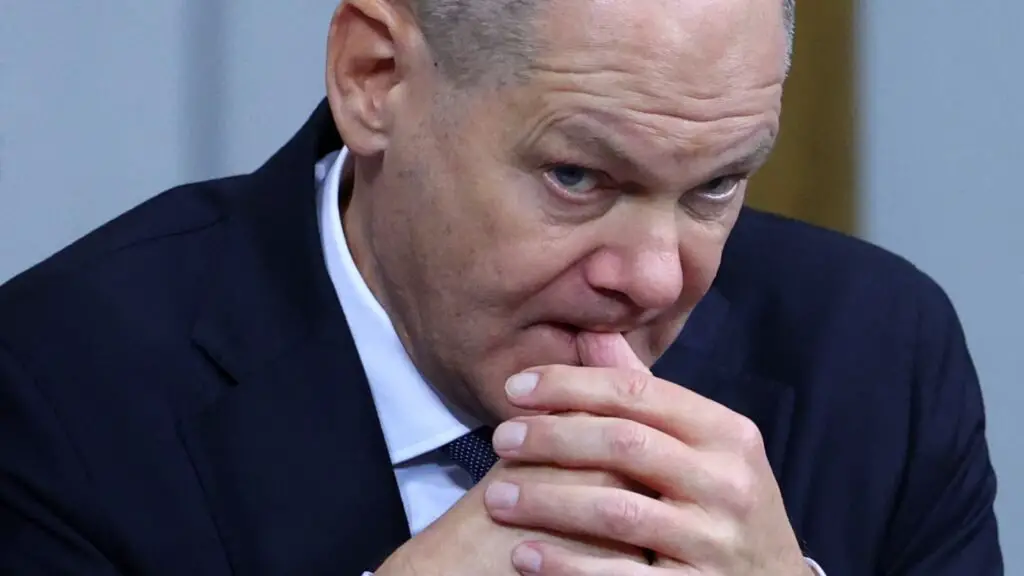German Chancellor Olaf Scholz will undergo a vote of confidence in Parliament on Monday, December 16th.
Michael Kappeler | Picture Alliance | Getty Images
German Chancellor Olaf Scholz lost a vote of confidence in the country’s Bundestag on Monday, clearing the way for one early elections in February.
Scholz was expected – and hoped – to lose the vote he himself had called for in November trigger earlier than planned electionswhich were originally planned for autumn 2025.
It is only the sixth time in Germany’s history that such a vote has taken place and the fourth time that a president has violated the vote.
Scholz said on Monday that he had called for a vote not just for parliament, but for the entire electorate.
“Let’s dare to be a strong country and invest powerfully in our future,” Scholz told MPs before the vote, according to a Google translation.
Scholz fired former finance minister Christian Lindner in November, effectively ending the governing coalition in Germany that had been in power since 2021. It consisted of Scholz’s Social Democratic Party (SPD), Lindner’s Free Democratic Party (FDP) and the Greens.
The SPD and the Greens have effectively remained in government as a minority government and will continue to do so after Monday’s vote until a new Bundestag is formed. However, without the parliamentary majority required to pass laws, Scholz is widely viewed as a lame duck.
The three-party coalition government was plagued by disagreements over budget and economic policy positions. Tensions came to a head with an essay written by Lindner in which he presented his vision for revitalizing the German economy. However, the former finance minister also spoke out against the fundamental positions of the SPD and the Greens in the paper.
The parties also struggled to finalize Germany’s 2025 budget and ultimately appeared unable to reach a solution.
The government will now work with a provisional budget until the incumbent Bundestag implements its own budget. The German Finance Ministry said on Monday that it does not expect a preliminary spending plan for 2025 until the middle of next year at the earliest.
What happens next?
Federal President Frank-Walter Steinmeier now has 21 days to dissolve parliament. A new election must then take place within 60 days of this dissolution, with the date already set February 23rd.
The German constitution sets out a series of procedures aimed at making the collapse of a government as calm as possible and avoiding the political unrest experienced by the Weimar Republic in the 1930s – a turbulent period that played a key role in its rise the government played Nazis in Germany.
The election campaign for the 2025 election has already begun. The German parties are discussing initial political proposals on key issues such as immigration, the economy, taxes, the debt brake and social security. Full manifestos are expected to be published in the coming weeks.
The parties have also announced which of their candidates they would propose for the chancellorship if he received the most votes. Despite the failure of the Scholz coalition, he was chosen as the SPD’s candidate for chancellor, while opposition leader Friedrich Merz will take on this role for the CDU.
The CDU and its Bavarian branch, the Christian Social Union (CSU), are currently in the lead Surveys It is likely to become the strongest party, which puts Merz in the best position to succeed Scholz as chancellor. The CDU/CSU is then widely expected to enter into a coalition with either the SPD or, in a less likely scenario, the Greens to form Germany’s next government.
Kallum Pickering, chief economist at Peel Hunt, said on Monday that Germany’s economic woes were likely to force a deal on new fiscal support regardless of the election outcome.
“Even if there are no changes to the debt brake in the new government’s first three to six months, I think economic conditions will ultimately force them to accept the reality that they need if they have a large enough majority “a fiscal stimulus,” Pickering told CNBC.Street signs Europe.”
“As soon as there is an economic stimulus in Germany, I think things will look a little better,” he added.





